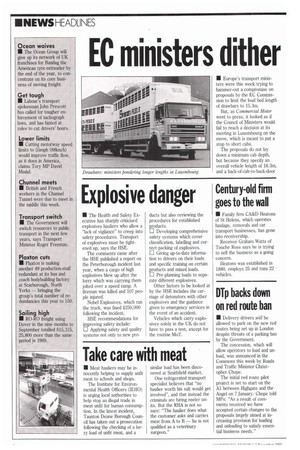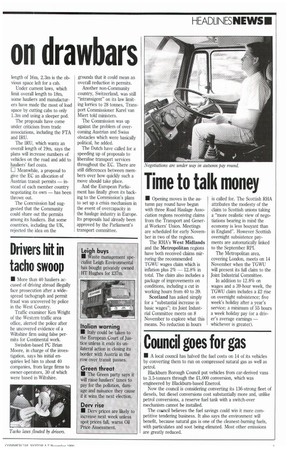EC ministers dither on drawbars
Page 6

Page 7

If you've noticed an error in this article please click here to report it so we can fix it.
• Europe's transport ministers were this week trying to hammer-out a compromise on proposals by the EC Commission to limit the load bed length of drawbars to 15.3m.
But, as Commercial Motor went to press, it looked as if the Council of Ministers would fail to reach a decision at its meeting in Luxembourg on the move, which is meant to put a stop to short cabs.
The proposals do not lay down a minimum cab depth, but because they specify an overall vehicle length of 18.3m, and a back-of-cab-to-back-door
length of 16m, 2.3m is the obvious space left for a cab.
Under current laws, which limit overall length to 18m, some hauliers and manufacturers have made the most of load space by cutting cabs to only 1.3m and using a sleeper pod.
The proposals have come under criticism from trade associations, including the ETA and IRU.
The IRU, which wants an overall length of 19m, says the plans will increase numbers of vehicles on the road and add to hauliers' fuel costs.
Li Meanwhile, a proposal to give the EC an allocation of Austrian transit permits — instead of each member country negotiating its own — has been thrown out.
The Commission had suggested that the Community could share out the permits among its hauliers. But some countries, including the UK, rejected the idea on the grounds that it could mean an overall reduction in permits.
Another non-Community country, Switzerland, was still "intransigent" on its law limiting lorries to 28 tonnes, Transport Commissioner Karel van Miert told ministers.
The Commission was up against the problem of overcoming Austrian and Swiss obstacles which were basically political, he added.
The Dutch have called for a speeding up of proposals to liberalise transport services throughout the EC. There are still differences between members over how quickly such a move should take place.
And the European Parliament has finally given its backing to the Commission's plans to set up a crisis mechanism in the event of overcapacity in the haulage industry in Europe. Its proposals had already been approved by the Parliament's transport committee.
























































































































